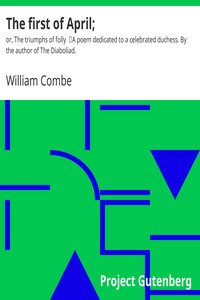The first of April; or, The triumphs of folly by William Combe
"The First of April; or, The Triumphs of Folly" by William Combe is a satirical poem written in the late 18th century. The book creatively explores the absurdities and follies prevalent in society, particularly focusing on the frivolities associated with fashion, rank, and social behavior. Through vivid imagery and engaging language, Combe critiques the superficiality of high society while reflecting on the universal nature of folly. The narrative unfolds on the first
day of April, a day symbolizing folly and foolishness, as the author is drawn into a grand celebration presided over by the Queen of Folly. Throughout this satirical festival, various characters representing the excesses of society—including the vain, luxurious, and morally ambiguous—offer their tributes to the Queen. As these offerings are presented, Combe uses humor and sharp commentary to illustrate the emptiness and futility of their pursuits, leading to a deeper critique of human nature and societal norms. The poem ultimately serves as a reflection on the timeless theme of folly, inviting readers to contemplate the inherent absurdities within their own lives and the world around them. (This is an automatically generated summary.)
Read or download for free
| How to read | Url | Size | |||
|---|---|---|---|---|---|
| Read now! | https://sendtokindle.compellingsciencefiction.com/ebooks/18988.html.images | 92 kB | |||
| EPUB3 (E-readers incl. Send-to-Kindle) | https://sendtokindle.compellingsciencefiction.com/ebooks/18988.epub3.images | 114 kB |
Send
to kindle email: |
||
| EPUB (older E-readers) | https://sendtokindle.compellingsciencefiction.com/ebooks/18988.epub.images | 114 kB | |||
| EPUB (no images, older E-readers) | https://sendtokindle.compellingsciencefiction.com/ebooks/18988.epub.noimages | 90 kB | |||
| Kindle | https://sendtokindle.compellingsciencefiction.com/ebooks/18988.kf8.images | 224 kB | |||
| older Kindles | https://sendtokindle.compellingsciencefiction.com/ebooks/18988.kindle.images | 253 kB | |||
| Plain Text UTF-8 | https://sendtokindle.compellingsciencefiction.com/ebooks/18988.txt.utf-8 | 61 kB | |||
| Download HTML (zip) | https://www.gutenberg.org/cache/epub/18988/pg18988-h.zip | 112 kB | |||
| There may be more files related to this item. | |||||
Similar Books
About this eBook
| Author | Combe, William, 1742-1823 |
|---|---|
| Title |
The first of April; or, The triumphs of folly
A poem dedicated to a celebrated duchess. By the author of The Diaboliad. |
| Note | Reading ease score: 63.9 (8th & 9th grade). Neither easy nor difficult to read. |
| Credits |
Produced by David Edwards, Taavi Kalju and the Online
Distributed Proofreading Team at http: //www.pgdp.net (This book was produced from scanned images of public domain material from the Google Print project.) |
| Language | English |
| LoC Class | PR: Language and Literatures: English literature |
| Subject | English poetry -- 18th century |
| Category | Text |
| EBook-No. | 18988 |
| Release Date | Aug 4, 2006 |
| Copyright Status | Public domain in the USA. |
| Downloads | 103 downloads in the last 30 days. |
| Project Gutenberg eBooks are always free! | |

